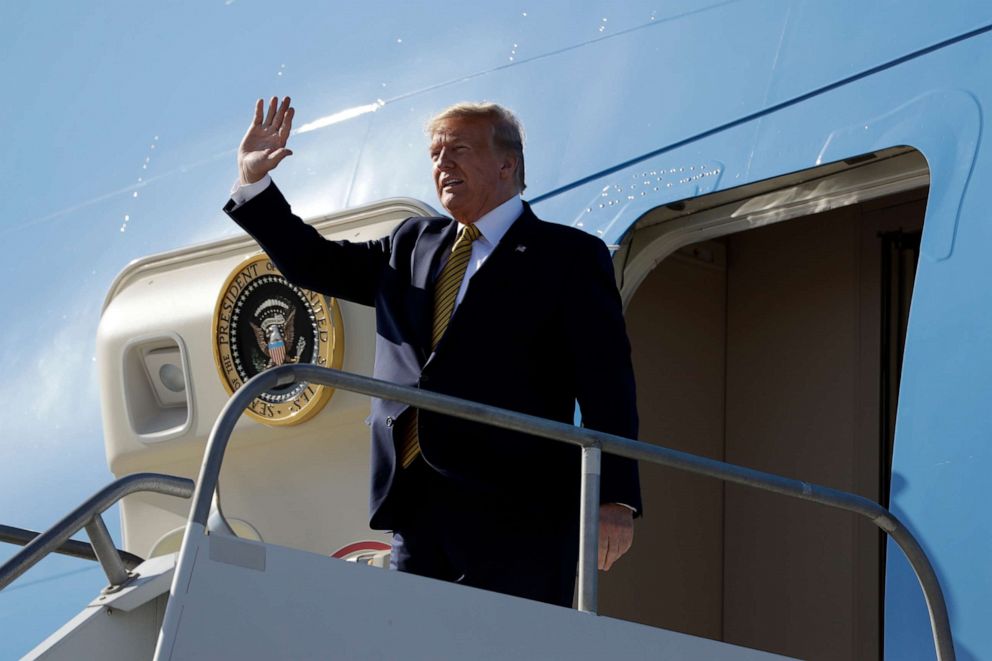Trump revokes California's waiver on emissions standards, setting up legal fight
The Trump administration wants a single, nationwide standard.
The Environmental Protection Agency and Department of Transportation announced a rule Thursday to block California -- or any other state -- from setting its own standards for fuel economy or greenhouse gas pollution from vehicles, saying they won't let the politics of one state set national policy.
The announcement comes a day after President Donald Trump said he would revoke a federal waiver that enabled California to set stricter standards for vehicle emissions, insisting that the move ultimately would produce "far less expensive" and safer cars.
The decision, announced via tweet during his trip to California, sets up a lengthy legal battle with the state and injects uncertainty into the automobile industry.
The "One National Program Rule" affirms that the National Highway Transportation Safety Board and EPA have the legal authority to set one national fuel economy standard, withdrawing California's waiver to set its own higher standards.
California leadership wanted stricter standards to combat smog. Wheeler and Transportation Secretary Elaine Chao argued that California's use of its waiver to set its own policy effectively set national policy, increasing the cost of vehicles sold in states with less pollution.
"We will not let political agendas in a single state be forced upon the other 49, and we will always put safety first," Chao said at the announcement.
Wheeler and Chao said the state should prioritize its other air pollution problems, citing several areas that are not in compliance with requirements to reduce pollution.
"California cars have no closer link to California climate impacts then do cars on the road in Japan or anywhere else in the world. And California's climate impacts are not extraordinarily distinct from those felt in other states in the same way that its smog impacts are," Wheeler said Thursday. "It makes sense that Congress carved out waiver authority for California to address its distinct local problems. It does not make sense to use that authority to try to address national and global issues like greenhouse gas emissions."

In a House Science Committee hearing Thursday morning, California Rep. Zoe Lofgren accused the administration of contradicting itself in past statements and abusing its power in the reported antitrust investigation of automakers working with California on efficiency rules.
"California had more than 100 waivers in the last 50 years by both Democratic and Republican presidents to achieve a standard that has made automobiles 99% cleaner than they would've been otherwise," Lofgren said. "You created chaos here because the automakers are not going to know what to do. This is going to be tied up in court for the foreseeable future."
Wheeler responded by pointing out the action only targets California's greenhouse gas emissions rules for cars and trucks but still allows the state to regulate other kinds of pollution from vehicles.
"It's important to remember that we're doing nothing to take away California's ability to set health-based standards for automobiles, only energy efficiency," he said.
California Gov. Gavin Newsom, a Democrat, accused Trump of having a "political vendetta" against the state, and environmental groups warned the decision would worsen air pollution.
"Our message to those who claim to support states' rights: Don't trample on ours," California Attorney General Xavier Becerra said at a press conference.
Trump said in his tweets that preventing tough restrictions from going into effect would lead to increased production. That increased production, in turn, would encourage consumers to replaces old cars with "extremely environmentally friendly cars."
"Many more cars will be produced under the new and uniform standard, meaning significantly more JOBS, JOBS, JOBS!" he tweeted. "Automakers should seize this opportunity because without this alternative to California, you will be out of business."

Trump's announcement caps a long-running dispute between his administration, which in 2018 moved to scrap Obama-era standards on fuel efficiency standards, and Democratic state officials in California, which had already secured a waiver under the Clean Air Act to set their own stricter requirements.
In July, California escalated the feud by reaching a voluntary agreement with four major automakers -- Ford, BMW, Honda and Volkswagen -- to adhere to stricter standards even if Trump's regulatory rollbacks were finalized. More than a dozen states have promised to adopt these tougher standards.
The Justice Department responded by launching an antitrust investigation into the four automakers.
For their part, automakers have been cautious in responding. Dave Schwietert, interim CEO and president of the industry group Auto Alliance, said his group was still reviewing the action to "get the full picture of how this impacts automakers, our workers and our customers."
In his statement though, he noted the group supports "one national program" and to "avoid a marketplace with different standards."
Sen. Tom Carper of Delaware, the top Democrat on the Senate Environment and Public Works Committee, warned that automakers didn't want the years of uncertainty with a protracted legal fight as the nation debates tailpipe pollution.
Based on "numerous meetings and conversations, I am confident that no automaker wanted this outcome," he said in a statement. "In fact, it's the exact outcome they sought to avoid."



